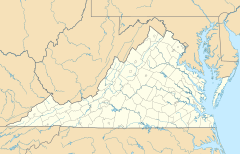Cleveland Barrens Natural Area Preserve facts for kids
Quick facts for kids Cleveland Barrens Natural Area Preserve |
|
|---|---|
| Location | Russell County, Virginia |
| Area | 1,288 acres (5.21 km2) |
| Governing body | Virginia Department of Conservation and Recreation |
The Cleveland Barrens Natural Area Preserve is a special protected area in Russell County, Virginia. It covers about 1,288 acres (5.2 square kilometers) of land. This preserve is located in the beautiful Clinch River Valley.
Contents
What is a Natural Area Preserve?
A Natural Area Preserve is a place set aside to protect rare plants, animals, and natural habitats. These areas help keep important parts of nature safe for the future. The Cleveland Barrens is part of the Virginia Natural Area Preserve System.
Why Cleveland Barrens is Special
This preserve is very important because it protects something called "dolomite barrens." These are unique natural areas that are rare around the world. A barren is like a small, open space in a forest.
What are Dolomite Barrens?
Dolomite barrens are special because of their soil and rocks. They have thin, rocky soil, often made of limestone or dolomite rock. The ground is usually dry, and you can see exposed rock. These areas are different from the surrounding forests.
At Cleveland Barrens, there are four of these barrens. They are found on steep slopes that face the southwest. This means they get a lot of sun.
Plants and Animals
These barrens are home to special plants. You will find many warm-season grasses growing here. Some examples include indiangrass, big bluestem, and little bluestem.
The preserve also protects many rare species. There are thirteen different kinds of rare plants found here. Also, three types of rare insects live in this special habitat.
Who Manages the Preserve?
The Virginia Department of Conservation and Recreation owns and takes care of the Cleveland Barrens Natural Area Preserve. They work to keep this important natural area healthy.
Visiting the Preserve
The preserve does not have special paths or visitor centers for the public. If you want to visit, you need to plan ahead. You must contact a state land steward first to make arrangements. This helps protect the sensitive habitats inside the preserve.


